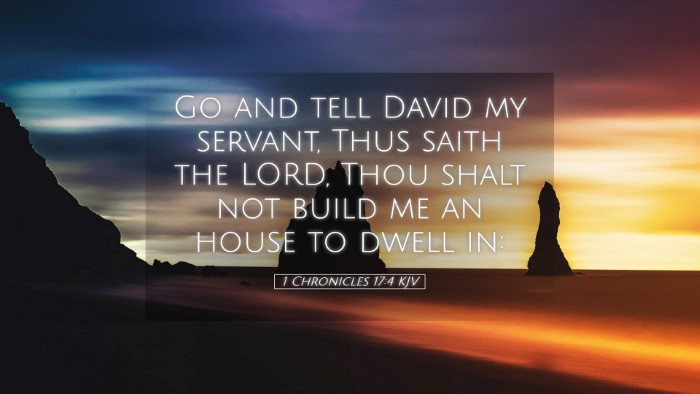Commentary on 1 Chronicles 17:4
Verse: "Go and tell David my servant, Thus saith the LORD, Thou shalt not build me a house to dwell in."
Introduction
The context of 1 Chronicles 17:4 presents a significant moment in biblical history, where God communicates critical instructions to David about the temple. This commentary seeks to provide a comprehensive analysis of this verse, drawing on insights from various public domain commentaries, including those by Matthew Henry, Albert Barnes, and Adam Clarke. The interpretation is directed toward pastors, students, theologians, and Bible scholars desiring a deeper understanding of the text's implications.
Contextual Background
David, having secured peace in Israel after many conquests, wishes to build a permanent dwelling for the Ark of the Covenant. This desire arises from a heart longing to honor God. However, the Lord's response is pivotal. It is essential to understand the broader narrative of God's covenant with David, which frames this instruction.
God's Response to David
Divine Initiative:
The phrase "Thus saith the LORD" emphasizes the divine authority behind the declaration. As Matthew Henry notes, God’s voice and command hold the highest weight, stressing the importance of obedience to divine revelation even when it contradicts personal desires.
God’s Sovereignty
God’s pronouncement underscores His sovereignty over worship and the physical temple. As Albert Barnes articulates, God's dwelling is not limited to human constructions. The choice to not permit David to build a temple reveals God’s plan and timing, indicating that true spirituality transcends physical structures.
The Significance of David’s Role
David is addressed as "my servant," a title indicating his faithfulness and special relationship with God. Adam Clarke points out that this title attests to David’s humble and obedient heart. Despite his esteemed position as king, David’s essence is captured in servanthood—the highest calling in the Kingdom of God.
David’s Initial Intent
David's desire to build a house for God symbolizes a yearning for intimacy and commitment. His intention, noble as it was, also reflects a common human struggle: to express devotion through tangible means. The Lord's response invites deeper reflection on what it means to honor God beyond physical offerings.
Theological Implications
Understanding God’s Will:
This verse challenges readers to grapple with the nature of divine will. It prompts reflection on how God often redirects good intentions towards His purposes. As emphasized in Matthew Henry’s commentary, believers are encouraged to align their desires with God’s plans, recognizing that His ways are higher than ours.
Faith Beyond Structures
The refusal to permit the temple’s construction teaches that God values authenticity over form. Albert Barnes notes that worship exists not in physical buildings alone but in the hearts of worshippers. Therefore, a lesson here is that believers must cultivate an inner sanctum of faith and relationship with God rather than rely solely on institutional practices.
Historical and Prophetic Elements
The refusal to allow David to build a house marks a transition toward the eventual construction of the temple by Solomon. Adam Clarke highlights the prophetic nature of this decree, pointing to a future hope where God’s dwelling among His people will be realized through Christ, the true temple. The narrative foreshadows the New Testament understanding of the temple as the body of Christ and the collective body of believers.
Conclusion
The verse 1 Chronicles 17:4 encapsulates profound themes of divine authority, the nature of worship, and the heart of service. Through the insights of Matthew Henry, Albert Barnes, and Adam Clarke, readers are invited to meditate on the implications of God's command to David, leading to a richer understanding of faith that transcends the physical to embrace the spiritual.
As we reflect on this passage, may we also seek to align our lives with God's greater purposes and understand the depth of relationship He desires with each of us—the living temples made for His glory.


